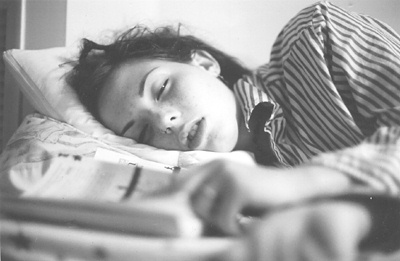All Nonfiction
- Bullying
- Books
- Academic
- Author Interviews
- Celebrity interviews
- College Articles
- College Essays
- Educator of the Year
- Heroes
- Interviews
- Memoir
- Personal Experience
- Sports
- Travel & Culture
All Opinions
- Bullying
- Current Events / Politics
- Discrimination
- Drugs / Alcohol / Smoking
- Entertainment / Celebrities
- Environment
- Love / Relationships
- Movies / Music / TV
- Pop Culture / Trends
- School / College
- Social Issues / Civics
- Spirituality / Religion
- Sports / Hobbies
All Hot Topics
- Bullying
- Community Service
- Environment
- Health
- Letters to the Editor
- Pride & Prejudice
- What Matters
- Back
Summer Guide
- Program Links
- Program Reviews
- Back
College Guide
- College Links
- College Reviews
- College Essays
- College Articles
- Back
Don’t Snooze, You Lose
Sleep is vital – and it’s likely you’re not getting enough of it
I wasn’t surprised when I heard that Australian youths are the 3rd most sleep-deprived in the world. As a student, I see a multitude of my peers suffering from symptoms of sleep deprivation almost every day. Those who do have a higher risk of developing all kinds of diseases as well as moodiness, aggression and depression. On top of that, their academic performance also suffers too. It’s not just the youths too – around 40% of Australian adults suffer from sleep depression as well.
What many people fail to realise is that sleep is extremely vital to our health.
Helen Burdette, the executive secretary of Sleep Health Foundation Australia, described that sleep is essential for the body to repair tissue, produce hormones which control our body’s many different functions, grow muscles, remove waste and strengthen memories.
It’s clear that without enough sleep, we don’t function as well as we should.
If you’re sleep deprived, your risk of developing a variety of health problems skyrockets. Some of these include increased risks for certain cancers, skin ageing, weight gain, impaired memory, Alzheimer’s disease, cardiovascular disease, type 2 diabetes, mental health issues and immune system disorders. Research suggests that being regularly sleep-deprived puts you at a much higher risk of contracting infectious diseases as the immune system is not able to work as effectively as it would with the recommended amount of sleep. It’s like ending a washing machine cycle too early – our bodies wake up feeling like wet and dirty laundry.
On top of those health effects, sleep deprivation kills over 3000 Australians every year due to fatigue-related accidents. This number is extremely high, and it’s rising. Burdette points out that driving while being severely sleep deprived can be just as dangerous as driving under the influence of alcohol or drugs. The impacts of sleep deprivation can even be felt at an economic level. Researchers (Hillman et al., 2018) estimate that sleep deprivation cost the country 1.55% of its total GDP in the 2016-2017 financial year, or around 18 billion dollars. This is because sleep deprivation lowers productivity, increases unsafe behaviours and mortality rates.
How can we get more sleep then?
Firstly, schedules should be adjusted in the day to minimise interfering with sleep to as little as possible. Electronics use before bedtime should be avoided at least 1 hour before going to sleep - blue light emitted from electronic screens can adversely impact on sleep quality. The cool light from our screens causes the receptors in the back of the retina to believe that it’s daytime. This, in turn, suppresses a hormone called melatonin which induces fatigue. Although most phones feature blue light filters, which limits the amount of blue light the screen emits by tinting the screen to a warmer colour, it’s still best to limit exposure to any artificial light around bedtime, as any light can interfere with the body’s natural sleep rhythm. Also, caffeinated drinks should be avoided within 6 hours of going to bed. Keeping a consistent sleep schedule, even on weekends, will also improve sleep quality and will help you wake up easier, feeling more refreshed and energised.
As Burdette puts it, “sleep deprivation is becoming an epidemic in Australia.” Ultimately, it’s up to us to get the amount we need. It’s just about getting enough hours in. Won’t you call that a good investment for a healthier, more energetic self?

Similar Articles
JOIN THE DISCUSSION
This article has 0 comments.

I am a student studying in Melbourne, Australia.